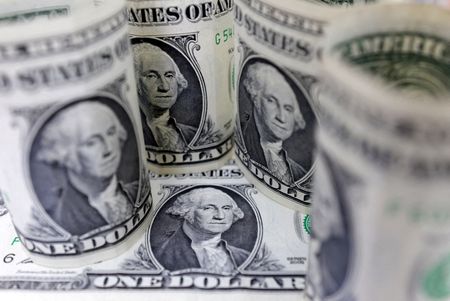
By Rae Wee
SINGAPORE (Reuters) – The dollar retreated on Tuesday following an overnight rally that saw investors flocking to the safe-haven currency on worries over China’s COVID flare ups, though cautious risk sentiment kept the greenback supported.
The fresh bout of risk aversion had weighed particularly on the antipodean currencies – often used as liquid proxies for the Chinese yuan – with the Aussie sliding nearly 1% overnight. It recouped some losses on Tuesday, rising 0.14% to $0.6615.
The kiwi was last 0.36% higher at $0.6122, after falling more than 0.8% overnight.
China’s capital warned on Monday that it was facing its most severe test of the COVID-19 pandemic, with a surge in COVID cases sparking fresh restriction measures. Deaths from the virus were also recorded in Beijing for the first time since late May.
The offshore yuan gained 0.3% to 7.1574 per dollar in Asia trade, after falling more than 0.7% overnight.
“The situation in China is deteriorating. There does seem to be some … increased restrictions on movement of people, and I think there’s going to be inevitable economic impacts,” said Joseph Capurso, head of international and sustainable economics at Commonwealth Bank of Australia.
“What’s going on in China is going to take centre stage.”
Similarly, the euro was up 0.12% at $1.0253, after its 0.8% overnight loss, while sterling rose 0.25% to $1.1845, partially reversing its 0.6% fall overnight.
“It could just be a consolidation phase after yesterday’s pretty big move up,” said Capurso of the U.S. dollar.
The Japanese yen last traded 0.2% higher at 141.79 per dollar, after slumping more than 1% to the weaker side of 142 per dollar in the previous session.
“The curiosity is how Japan has also shown a great deal of sensitivity … if anything, the takeaway there is that Japan’s safe haven appeal is no longer there,” said Rodrigo Catril, a currency strategist at National Australia Bank, of the yen.
“It’s more like a cork in the ocean, subject to risk aversion as well as movements in 10-year Treasury yields.”
U.S. Treasury yields across most maturities inched higher overnight, as investors continued to re-price expectations for how high the Federal Reserve will hike rates as it attempts to bring inflation down from close to 40-year highs.
The benchmark 10-year Treasury yield eked out a marginal gain overnight, and last stood at 3.8212%. [US/]
The U.S. dollar index fell 0.08% to 107.68. It had risen close to 0.8% overnight, the largest daily gain since Nov. 3.
Speeches from Fed speakers on Monday delivered few surprises, with Cleveland Fed President Loretta Mester saying the central bank can downshift to smaller interest rate hike increments from next month.
San Francisco Fed President Mary Daly said the real-world impact of interest rate hikes is likely greater than what its short-term rate target implies.
“Fed comments remained in line with the recent slant of rhetoric,” said economists at ING in a note.
In the cryptoverse, lender Genesis was the latest victim to come under the spotlight following the collapse of crypto exchange FTX.
Genesis said on Monday it has no plans to file for bankruptcy imminently, though Bloomberg News reported, citing sources, that Genesis was struggling to raise fresh cash for its lending unit, and warning investors it may need to file for bankruptcy if it does not find funding.
Bitcoin was last 0.12% higher at $15,785, while Ether lost 0.71% to $1,097.70.
(Reporting by Rae Wee; Editing by Sam Holmes and Kim Coghill)

